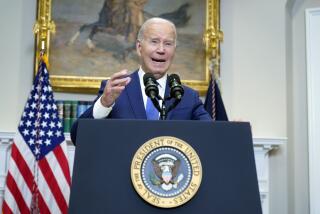If the States Have Their Way, It May Be Downright Taxing to Peddle by Mail to Yuppies
Last year the nation’s direct mail-order houses flooded our mailboxes with 12 1/2 billion catalogues. After the sellers reaped $35 billion in sales, their paper avalanche--about 50 catalogues for every man, woman and child in America--had to be hauled off to our cities’ overflowing trash dumps.
But now the big mail guys are screaming with indignation at the thought that they, like the nation’s other retailers, should have to collect state sales taxes.
The battle has moved to Congress, where House Judiciary Chairman Jack Brooks (D-Tex.) would force collection of sales taxes by mail-order houses engaged in “regular or systematic soliciting of sales” in the customer’s state. Brooks’ bill would reverse a 1967 Supreme Court decision that mere solicitation by mail didn’t constitute doing business in a state. That gaping loophole has left the direct-marketers off the sales tax-hook ever since.
But direct mail now has 88 million customers and commands 15% of the U.S. retail market--a far cry from the ‘60s. Inability to collect taxes on out-of-state sales costs the 50 states close to $3 billion a year. California is forgoing $389 million a year, New York $334 million, Texas $329 million, Florida $137 million, reports the National Assn. of State Budget Officers.
Revenue-hungry states and cities, joined by regular retailers who’d love a level playing field, have been beseeching Congress to right things. They want to force the 350 biggest mail-order houses, which account for 70% of the business, to collect the sales tax due in the customer’s state.
The mail-order giants’ sales-tax advantage, says North Dakota Gov. George Sinner, is “overwhelming the Main Street retailer.” It’s preposterous, he says, for mail-order houses to claim that they’re not in business in a state when they send delivery trucks up and down its roads, cram mailboxes with catalogues, generate billions of pounds of waste paper to pick up and dump--and then take their deadbeat customers into state courts.
The direct mail-order firms are not about to take this equity pitch lying down. In February, 1 million customers of Land’s End, a huge Wisconsin-based direct retailer, found snuggled among ads for turtlenecks and resort slacks a “tax alert” flyer urging them to write Congress protesting the Brooks bill. Other direct-mailers have followed suit, using their computerized mailing lists to urge us all to “help stamp out the abuse tax.”
You can weep when you hear Sen. Robert Kasten, from Land’s End’s home state, claim that the Brooks bill “unfairly targets the elderly, the handicapped, farm families” and “millions” of others who rely on mail orders “for many of their basic needs.”
One can question whether $6,000 racing boats, $400 briefcases, $200 neon telephones and $5,000 jewelry pieces peddled to an affluent Yuppie generation are “basic needs” that ought to remain tax-exempt.
But when Kasten spoke in May to the Direct Marketing Assn., the industry’s lobby arm, he suggested emphasizing customers’ suffering because hardship imposed on business is “not as good politically.” Kasten’s counsel to the mail-order crowd: “We’ve got to get consumers to call or write. We’ve got to scare them that it’s a big problem . . . You should exaggerate.”
Sinner’s rejoinder: An adequate state sales tax “literally means the ability to get teachers’ salaries within a civilized range, and to get help for the elderly.”
The big mailers also argue that customers would be hopelessly confused--even “abused”--by having to calculate their own state’s sales tax. They have a point: Some states tax clothing, others not; some food, others not.
But Sears and J.C. Penney, operating and collecting taxes in all 50 states, have easily mastered the varying state rules. Most customers let the mail-order house add up the final cost anyway. So what? one asks, if an L.L. Bean or Sharper Image has to reprogram its state-of-the-art computers to calculate a customer’s home-state sales tax.
But the white hats in this fight--states and localities--have had trouble getting and keeping their own act together. They disagree on whether states would be required to share with cities the prospective revenue gain. A state-city compromise, following 18 months of negotiation, seems to have fallen apart--at least for the moment.
But the high stakes are enough to keep both sides struggling for victory. You might wonder in this where the White House, in a states’ rights Administration, stands. The answer: total silence. Critics note that John Sununu, Bush’s chief of staff, is from New Hampshire, one of only five states with no sales tax.
Meanwhile, 18 states have gone back to court to try to force out-of-state mail-order houses to collect their taxes for them. Between a possible Supreme Court reversal and congressional action, the days of the tax holiday appear numbered.
If you want a $1,000 computerized treadmill, better call up and order it now.






